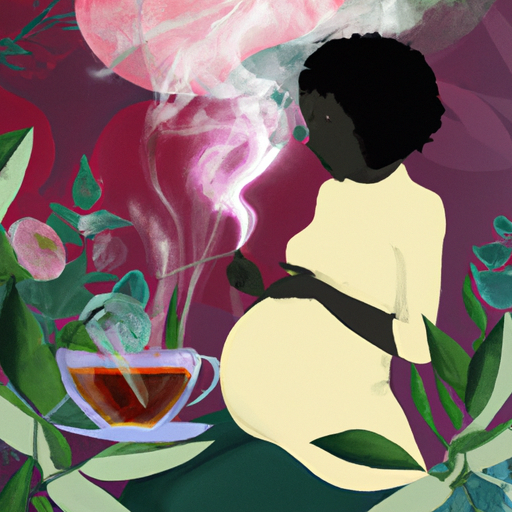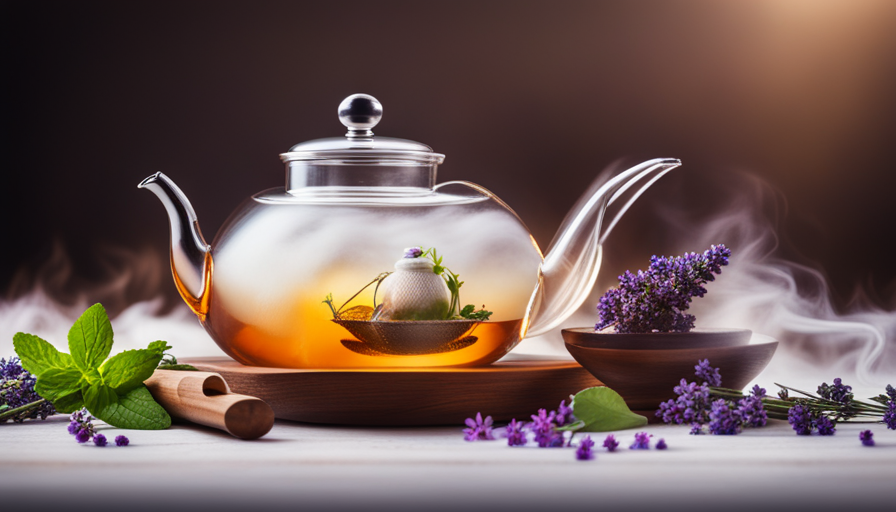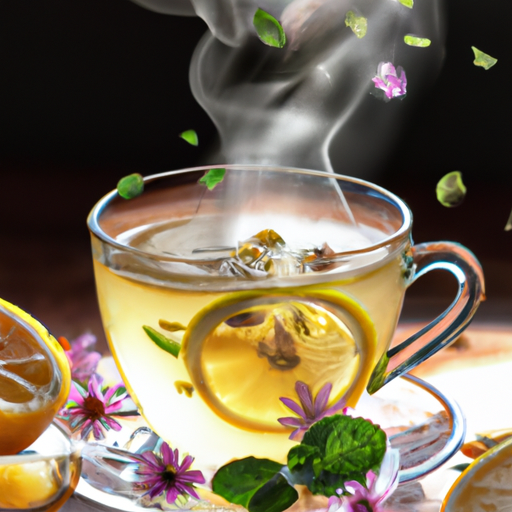As the saying goes, ‘A cup of tea solves everything.’ But what about when you’re expecting? Can you still enjoy the comforting ritual of sipping herbal tea during pregnancy?
As a soon-to-be mother myself, I embarked on a quest for answers, eager to find out if indulging in my favorite herbal blends was safe for my little one.
In this well-researched and evidence-based article, we will explore the risks and benefits of consuming herbal tea while pregnant. We will delve into the specific herbal teas that are considered safe for expectant mothers, as well as the best practices for brewing and consuming them.
Pregnancy is a time of immense joy and wonder, but it also comes with its fair share of concerns. With so much conflicting information out there, it’s important to rely on reliable sources and listen to our bodies.
So, if you’re curious about enjoying herbal tea during pregnancy, join me as we navigate this journey together, ensuring a healthy and enjoyable experience for both you and your baby.
Key Takeaways
- Not all herbal teas are safe during pregnancy, so it is important to consult a healthcare provider before consuming them.
- Some herbal teas, such as ginger, peppermint, and chamomile, can be effective for relieving nausea and promoting relaxation during pregnancy.
- Certain herbal teas, like chamomile and peppermint, have anti-inflammatory properties and can support digestive health during pregnancy.
- It is essential to prioritize a balanced diet and proper nutrition during pregnancy, and herbal teas can be used as natural remedies for pregnancy discomforts, but it is important to consult a healthcare provider before incorporating them into your routine.
Understanding the Risks of Herbal Tea During Pregnancy
Are you wondering about the potential risks of enjoying a cup of herbal tea while you’re pregnant? It’s important to understand that not all herbal teas are safe during pregnancy. Some herbal teas can have risks and side effects that can be harmful to both you and your baby.
That’s why it’s crucial to consult with your healthcare provider before incorporating herbal teas into your pregnancy routine. They can provide guidance and help you make informed decisions about which herbal teas are safe for you to consume.
While some herbal teas are considered safe for pregnant women, others may contain herbs that can stimulate contractions or affect hormone levels. It’s always best to err on the side of caution and seek professional advice.
Now let’s explore safe herbal tea options for pregnant women.
Safe Herbal Tea Options for Pregnant Women
Exploring the wide array of soothing and pregnancy-friendly herbal infusions is like discovering a warm embrace for expectant mothers. When it comes to herbal tea options during pregnancy, it’s crucial to strike a balance between understanding the benefits and potential risks.
While herbal teas can provide numerous benefits such as relieving nausea, aiding digestion, and promoting relaxation, it’s important to approach them with caution. Some herbal teas may contain ingredients that could be harmful to the developing baby or stimulate uterine contractions.
To ensure safety, it’s advisable to consult with a healthcare professional before incorporating any herbal tea into your pregnancy routine. By understanding the potential risks, you can make informed decisions to protect both yourself and your baby.
Now, let’s delve into the subsequent section to explore the incredible benefits of drinking herbal tea during pregnancy.
Benefits of Drinking Herbal Tea During Pregnancy
During my pregnancy, I discovered the numerous benefits of drinking herbal tea. Not only did it help relieve my nausea and morning sickness, but it also promoted relaxation and better sleep.
Additionally, I found that herbal tea supported my digestive health, easing any discomfort or bloating I may have experienced.
Relieving Nausea and Morning Sickness
Try sipping on a cup of soothing herbal tea to relieve the queasiness and discomfort of morning sickness. Herbal teas such as ginger, peppermint, and chamomile have been found to be effective in relieving nausea during pregnancy.
Ginger tea, in particular, has been used for centuries to calm the stomach and reduce feelings of queasiness. It contains compounds that help to ease digestion and soothe the gastrointestinal tract.
Peppermint tea is known for its ability to relax the muscles of the stomach and intestines, which can alleviate nausea.
Chamomile tea, on the other hand, has calming properties that can help to reduce anxiety and promote relaxation.
In addition to relieving nausea, herbal teas can also aid in better sleep, which is essential for overall well-being during pregnancy. By promoting relaxation and better sleep, herbal teas can provide much-needed relief for pregnant women.
Promoting Relaxation and Better Sleep
To promote relaxation and get a better night’s sleep, you should consider sipping on soothing herbal teas like chamomile, ginger, or peppermint.
Chamomile tea is known for its calming properties and can help reduce anxiety and stress, making it an excellent choice for winding down before bed.
Ginger tea has been used for centuries to aid with digestion and relieve gastrointestinal discomfort, which can often interfere with a good night’s sleep.
Peppermint tea is not only refreshing but also helps to relax the muscles in the body and promote a sense of calmness.
By incorporating these herbal teas into your routine, you can create a peaceful bedtime ritual and improve the quality of your sleep.
Speaking of digestive health, let’s move on to the next topic.
Supporting Digestive Health
If you want to keep your digestive system running smoothly, it’s like having a well-oiled machine that keeps everything flowing effortlessly. Here are four ways herbal tea can support digestive health:
-
Soothing inflammation: Certain herbal teas, such as chamomile and peppermint, have anti-inflammatory properties that can help reduce inflammation in the digestive tract.
-
Relieving bloating and gas: Ginger tea is known for its ability to relieve bloating and gas by promoting digestion and reducing spasms in the intestines.
-
Calming an upset stomach: Herbal teas like fennel and dandelion can help calm an upset stomach and alleviate symptoms like nausea and indigestion.
-
Improving bowel movements: Senna tea, a natural laxative, can help promote regular bowel movements and relieve constipation.
Incorporating herbal teas into your routine can be beneficial for maintaining digestive health. Moving on to best practices for brewing and consuming herbal tea, let’s explore how to make the most of this soothing beverage.
Best Practices for Brewing and Consuming Herbal Tea
When brewing and enjoying your herbal tea during pregnancy, it’s essential to follow best practices to ensure the utmost safety and benefits for both you and your baby. To help you make informed decisions, here are some key brewing techniques and herbal tea safety tips to keep in mind.
| Brewing Techniques | Herbal Tea Safety | Recommended Varieties |
|---|---|---|
| Use fresh, filtered water | Choose organic teas whenever possible | Ginger tea for morning sickness |
| Steep tea for the recommended time | Avoid teas with caffeine or artificial additives | Peppermint tea for digestion |
| Use the correct water temperature | Check for potential allergens or contraindications | Chamomile tea for relaxation |
By following these brewing techniques and considering herbal tea safety, you can enjoy the many benefits of herbal tea during pregnancy. However, it’s important to remember that moderation and listening to your body are key. Transitioning into the next section, let’s explore the importance of paying attention to your body’s signals and maintaining balance during this precious time.
Moderation and Listening to Your Body
Finding the right balance and staying attuned to my body’s signals is crucial for a healthy and enjoyable pregnancy journey. When it comes to herbal tea, moderation is key. While it can be a comforting and soothing beverage, it’s important to listen to my cravings and consult my healthcare provider before consuming it.
Some herbal teas may have potential risks or interactions with pregnancy, so it’s always best to get professional advice. Additionally, certain herbs, like chamomile and peppermint, are generally considered safe in moderation during pregnancy. However, it’s important to avoid excessive consumption or relying solely on herbal tea for hydration.
As I navigate my pregnancy, I’ll continue to listen to my body and make informed choices about my herbal tea consumption. Moving forward, considering other aspects of a healthy pregnancy is essential for my well-being and that of my baby.
Other Considerations for a Healthy Pregnancy
When it comes to having a healthy pregnancy, there are several key considerations to keep in mind.
Firstly, maintaining a balanced diet and proper nutrition is crucial for the well-being of both the mother and the developing baby. It’s important to eat a variety of foods from different food groups to ensure you’re getting all the necessary nutrients.
Secondly, staying hydrated is essential during pregnancy as it helps with digestion, circulation, and overall health. Drinking plenty of water throughout the day is highly recommended.
Lastly, regular prenatal care and check-ups are vital to monitor the progress of the pregnancy and address any potential issues or concerns. It’s important to schedule regular appointments with your healthcare provider to ensure the best possible outcome for you and your baby.
Balanced Diet and Nutrition
To maintain a healthy pregnancy, it’s important for you to include a variety of nutritious foods in your diet. This should include essential nutrients like folic acid, iron, calcium, and omega-3 fatty acids. It is also recommended to take prenatal vitamins to ensure you’re getting all the necessary nutrients.
Herbal tea, such as chamomile or ginger, can be a great addition to your diet as they offer natural remedies for common pregnancy discomforts like nausea and insomnia. Imagine sipping a warm cup of herbal tea, feeling a sense of calm and nourishment as it flows through your body.
However, it’s important to consult with your healthcare provider before incorporating herbal teas into your routine to ensure they’re safe for you and your baby.
As we move on to the next section about staying hydrated, it’s essential to remember that hydration is crucial during pregnancy as it supports your overall health and well-being.
Staying Hydrated
Imagine yourself savoring a refreshing glass of ice-cold water, feeling its coolness quench your thirst and rejuvenate your body as you prioritize staying hydrated throughout your pregnancy journey. Staying hydrated is crucial during pregnancy as it aids in digestion, prevents constipation, and supports the development of the baby.
While water is the best choice for hydration, herbal teas can also be a great option. Some herbal teas, such as chamomile or ginger tea, offer additional benefits like soothing nausea or promoting relaxation. However, it’s important to note that not all herbal teas are safe during pregnancy. Some herbs may have adverse effects or stimulate the uterus. Therefore, it’s recommended to consult your healthcare provider before consuming any herbal tea.
Now, let’s move on to the next important aspect of your pregnancy journey – regular prenatal care and check-ups.
Regular Prenatal Care and Check-ups
Attending regular prenatal check-ups is essential for ensuring the health and well-being of both you and your growing baby. These check-ups allow healthcare professionals to closely monitor your pregnancy and address any concerns or complications that may arise. Regular prenatal care includes a series of tests and screenings to assess your baby’s growth, development, and overall health. It also provides an opportunity for you to ask questions, discuss any discomfort or changes you may be experiencing, and receive guidance on nutrition, exercise, and other aspects of a healthy pregnancy. By attending these check-ups, you are taking an active role in your prenatal care and giving your baby the best possible start in life. Now, let’s move on to the next section and discuss the conclusion: enjoying herbal tea safely during pregnancy.
Conclusion: Enjoying Herbal Tea Safely During Pregnancy
You can safely enjoy herbal tea while pregnant. It’s important to choose safe herbal tea brands that are free from caffeine and other harmful substances.
Here are five key points to consider:
- Herbal tea can be a great alternative to caffeinated beverages during pregnancy.
- Some safe herbal tea brands include chamomile, peppermint, ginger, and raspberry leaf tea.
- Herbal teas can provide various health benefits, such as reducing nausea and aiding digestion.
- It’s important to consult with your healthcare provider before consuming any herbal teas during pregnancy.
- While herbal tea is generally considered safe during pregnancy, it’s important to note that some herbs may have potential risks. Always do your research and consult with your healthcare provider.
Additionally, if you plan to breastfeed, it’s important to continue being cautious about the herbal teas you consume. Some herbs can pass through breast milk and affect your baby. It’s always best to consult with a healthcare provider to ensure the safety of both you and your baby.
Frequently Asked Questions
Are there any specific herbal teas that should be avoided during pregnancy?
It is generally safe to drink chamomile tea during pregnancy. However, caution should be exercised when consuming herbal teas with unknown ingredients, as they may pose potential risks to the health of both the mother and the baby.
Can herbal tea help with common pregnancy symptoms like morning sickness or insomnia?
Herbal tea can help with pregnancy symptoms like morning sickness and insomnia. However, it’s important to consult with a healthcare provider before using any herbal remedies. There may be alternative remedies available for morning sickness as well.
Is it safe to consume herbal tea in the first trimester of pregnancy?
Is herbal tea safe in the first trimester? Discover the benefits of herbal tea during pregnancy, including improved fertility and relief from common symptoms. Enjoy a soothing cup while nurturing your body and baby.
Can herbal tea have any negative effects on the baby’s development?
Herbal tea consumed in moderation during the first trimester is generally considered safe. However, certain herbal teas may have negative effects on the baby’s development. It is important to consult with a healthcare professional for personalized advice.
How much herbal tea is considered safe to drink during pregnancy?
During pregnancy, it is safe to consume moderate amounts of herbal tea. It can provide numerous benefits, such as reducing stress, aiding digestion, and boosting the immune system. However, consult with your healthcare provider for personalized advice.
Conclusion
In conclusion, while herbal tea can offer many benefits during pregnancy, it’s crucial to exercise caution and make informed choices. The safety of certain herbs and their potential effects on the developing baby varies, so it’s essential to consult with a healthcare provider before incorporating herbal tea into your pregnancy routine.
Remember to choose reputable brands, brew tea properly, and listen to your body’s signals. By taking these precautions, you can enjoy the soothing and nourishing qualities of herbal tea while promoting a healthy pregnancy.










